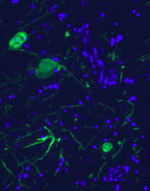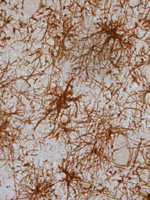
Campus Moncloa
Campus of International Excellence
Can a cannabinoid alleviate Parkinson”™s disease?
The Cannabinoid Research Group from the Faculty of Medicine of the Universidad Complutense de Madrid belonging to the Innovate Medicine within the Moncloa Campus has found that compound THCV has had successfully results in animal models of Parkinson's disease.
26/06/2012

Dopaminergic neurons (in green)
showing an altered morphology
in a parkinsonian pacient
The Cannabinoid Research Group from the Faculty of Medicine of the Universidad Complutense de Madrid belonging to the i-Health cluster within the Moncloa Campus has found that compound THCV has had successfully results in animal models of Parkinson's disease.
Cannabinoids have effects on all mammals because we have a cell signaling system, the endocannabinoid system, where these compounds act. Thus, during the course of various diseases such as Alzheimer's, Parkinson's or Huntington, this system has seen to be altered.
Keeping that in mind, this group of researchers has studied for ten years how the endocannabinoid system is altered in several neurodegenerative diseases and how they can modify it to reduce symptoms and prevent neuronal death associated with these ailments.
In August 2011, they published an article in the British Journal of Pharmacology where they explain how a cannabinoid is able to relieve the symptoms of Parkinson's disease. That cannabinoid is tetrahydrocannabivarin (THCV), found naturally in Cannabis sativa plant and has a similar structure to THC, but without its typical psychoactive effects.

Reactive glial cells (arrow) in a
parkinsonian patientbrain. These
cells are indicative of typical
neuroinflammation occured during
Parkinson”™s disease
To carry out this study, they caused Parkinson's disease to laboratory rats and then were treated with the cannabinoid, discovering that the symptoms had been relieved. Furthermore, analyzing the brains of these rats, they found that the cannabinoid rescued from death to most of the dopaminergic neurons, first to be affected during the disease. According to the authors, this fact may be due to diverse mechanisms, probably, including anti-inflammatory properties.
Although results are still preliminary, they could represent a breakthrough in the fight against Parkinson's disease because in addition to relieving symptoms, this compound may prevent disease progression as it prevents neuronal death, a fact that is not achieved with the existing therapies at the moment.
García C, Palomo-Garo C, García-Arencibia M, Ramos J, Pertwee R, Fernández-Ruiz J (2011). Symptom-relieving and neuroprotective effects of the phytocannabinoid Δ9-THCV in animal models of Parkinson's disease British Journal of Pharmacology: Aug; 163(7): 1495-506.
Authors of the article: Cristina Palomo Garo (coord.), María Concepción García García and Javier Fernández Ruíz.
Images with permission from the author: MMª Concepción García
Tag: i-Health Source: CEI Campus Moncloa
Event date:
26/06/2012
Science Outreach Awards

